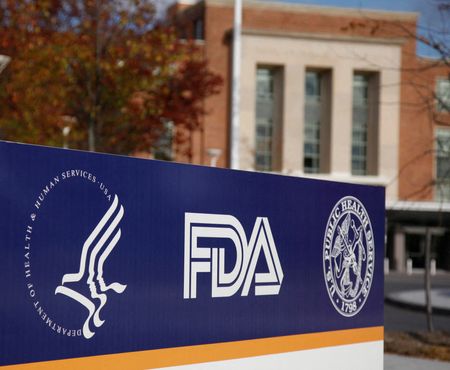LONDON (Reuters) -U.S. regulators are proposing to cap the amount of nicotine in cigarettes at non-addictive levels, in a potential world-first that could curb smoking and hit tobacco industry earnings.
The U.S. Food and Drug Administration (FDA), which regulates products containing nicotine, a highly addictive drug, first raised the idea of such a cap in 2017. It said this would save lives by preventing smoking-related disease and death caused by toxic chemicals created when tobacco burns.
On Wednesday, it proposed capping the level of nicotine, the chemical which keeps smokers hooked, at 0.7 milligrams per gram of tobacco in cigarettes and other combustible products, such as cigars and roll your own tobacco. Alternatives like vapes, nicotine pouches and heated tobacco would not be affected.
“By reducing the nicotine level… to a level low enough to no longer create or sustain addiction, that cycle of exposure to these toxic chemicals can be broken,” said FDA Center for Tobacco Products director Brian King at a press conference, adding the cap is about 95% lower than the nicotine concentration of cigarettes now on the market.
The agency’s modelling predicted such a cap could prevent 48 million youth or young adults from starting smoking, and more than 12.9 million people who smoke would give up within one year of it coming into effect. That would rise to 19.5 million within five years, it said.
That would threaten the profit engine of large tobacco companies like British American Tobacco and Marlboro-maker Altria. While they are growing sales from alternatives like vapes, the vast majority of their revenues still come from tobacco.
Shares in BAT and Altria were both down less than 1%.
Altria said the cap was unnecessary and lacked scientific support. Both companies said that the FDA’s proposal would fuel black markets for nicotine products.
“These actions would effectively eliminate legal cigarettes,” BAT added.
The FDA’s proposal is “truly game-changing”, said Yolanda Richardson, President and CEO of the Campaign for Tobacco-Free Kids, urging President-elect Donald Trump to finalise and implement the rule. He takes office on Jan. 20.
The public will have until September to provide comments on the proposal, the FDA said. The agency proposed any finalised rule become effective two years after publication.
(Reporting by Emma Rumney. Editing by Mark Potter and Alexander Smith)











